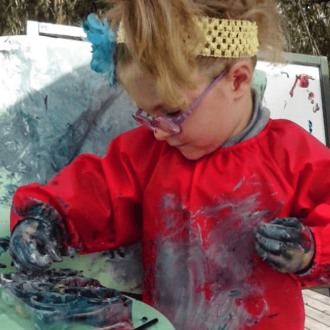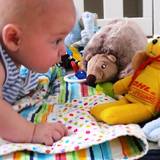Messy play survival tips for parents
|
Do you try to avoid doing messy play activities with your kids? You’re not alone! Not all parents relish the idea of messy play. Even the thought of organising messy play activities can be quite stressful for some parents. Find out how to survive messy play sessions at your place - and stay sane in the process!
|
You might also be interested in ...
The benefits of pretend play
Pretend play is an essential part of growing up, and as adults, it’s important for us to encourage toddlers and preschoolers to give it a go. Pretend play comes with many benefits too and helps develop a child’s creativity, recreate social relationships and learn how to get along with others. It’s also necessary developmentally too, being like a ‘rite of passage’ as a child gets older.
Play ideas for young babies
It's often hard to know how to play with young babies and how to keep them entertained. However, spending time together and interact with them will keep them amused for hours. Have a go at these play ideas with your newborn or young baby this week.







You’re not alone! Not all parents relish the idea of messy play.
Even the thought of organising messy play activities can be quite stressful for some parents. They are often reluctant to provide their kids with the resources and opportunities for messy play for fear of the chaos and mess it will create at home.
It’s true, it isn’t a clean activity, nor is it quiet, but there are many benefits of messy play for toddlers and preschoolers - and it’s so much fun!
From improved creative development to language development, cognitive development and social, emotional and physical development too.
Messy play lets children explore, try new things and practice skills they already know.
Find out how to survive messy play sessions at your place from our friends at Mud Mates - and stay sane in the process!
Messy play survival tips for parents
1. Lay down the rules for messy play
Kids appreciate being told the boundaries right at the start of an activity.
Decide on how you can limit the mess and stick with it. This can include staying in one area to play with the sand, or keeping their slime on the tarpaulin.
2. Cover up the messy play area
A simple way to keep messy play clean is to cover the play space before you start with an old sheet, tarpaulin or even a shower curtain.
Elasticated fitted tablecloths are ideal too for protecting your table top, especially if you’re using your dining room table!
3. Head outside for your messy play activities
Whether it's on the grass, the concrete or even the deck, the outside is a great place for messy play.
Spilt some slime? Just hose it off. Dropped the paint? Again, the hose is your best friend.
This is a great solution for parents who just can’t bear the thought of paint being trodden in all over the house.
4. Have a cleaning plan
You’ve accepted that mess will happen, so be prepared for it!
Gather all your supplies in one place, work out what you will clean first and enjoy a more orderly clean up.
Encourage your kids to clean up after themselves too.
5. Relax!
As stressful as it can be, know that accidents will happen and mess will be made.
You can help by limiting messy supplies and having cleaning products handy to wipe up all the spills.
More kids messy play articles to enjoy:
Source: This article was written by Mud Mates - Taking care of messy kids with protective over-garments, perfect for dirty, messy play, indoors and out.